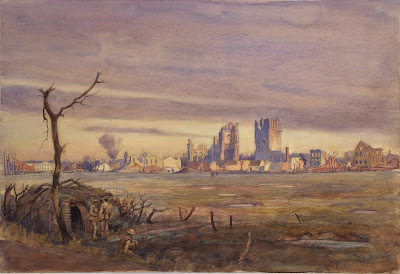The Peace Christmas: that’s what many called the holiday season of the winter of 1918. Just weeks earlier, the Armistice ended the world war that had lasted for over four years, involved thirty-two nations, and killed an estimated 16 million. Yet though the war was over, most of the fighting men and women volunteers had not yet returned home, but instead continued to serve overseas.
Carola Oman, daughter of an Oxford military historian, enlisted as a V.A.D. nurse on July 1, 1916. In December of 1918, she was working at the
British rest station in Boulogne, France.
Opposite us across the cobbled square
The trees stand black against the Christmas rain.
The clerk looks up a moment from his pen
In the kit-office, with a vacant stare,
And sees the flags drip grey upon the pain—
Chattering women, shawled and clutching toys,
A few civilians, porters, slouching men,
And shambling smoking youths, and shrieking boys,
Wandering on platforms.
It is noon;
But blue as dusk, and dark as melted snow
Can fill the flooded gutters. Very soon
The garish lamps will flicker out. And so
Comes the Peace Christmas to us. Is this all,
To stare and scribble while the shadows fall?
The light burns low. I see the canvas shake
Upon the walls. Now it has passed. In dark
I rise alone, and my tired footsteps make
Slow progress over a black landscape. Blank
Of a far-distant dog—the smell of rank
Forgotten country roads.
By my side now
There moves another traveler. As we walk
Down to the hurried village a high star
Burns with heroic light, and so we talk
Of recent wonders, for if men speak true
Three days the dawning sky has been inflamed.
There have been angels seen above the hills.
Of her eternal loneliness ashamed
The old year withers silently, but still
Listens, though not with hope. Now very wide
The ceaseless wind slashes the clouds apart.
And unprotected lies the countryside
Deserted, feeling for her frozen heart.
But in the village, as we pass near by,
The inn is overcrowded.
We pass on.
The star is stayed above the inn—or gone.
We only hear a new-born infant cry.
—Carola
Oman
This Christmas scene is grey and bleak. Rain-sodden flags
drip upon the pain of widows, fatherless children, refugees, and the myriads of
others who must now bear the aftereffects of the war. The pervasive mood is one
of desolation: now that peace has returned, is this shadowed world the best that
can be hoped for?
As dusk falls, the poem’s narrator leaves the shelter of her
canvas tent and wanders alone into the night. She makes her exhausted way
through the blackness, hearing the distant sounds of village life, until she
finds herself in the company of a stranger. They walk together under a star
that blazes with “heroic light,” discussing recent rumors of signs and wonders:
angels have been seen in the hills.
The crowded French town, besieged by the burdens of war,
blurs and recedes until its skies and inns recall another village in a far-off
land, where refugees sought shelter, peasants set out in search of the
miraculous, and distant foreigners journeyed to find a new king.
 |
| No. 3 Canadian Hospital, Dec 1918 |
Four years of brutal war have left the heart of the countryside unprotected and frozen; the mystery is whether the hearts of the men and
women who survived can be thawed and healed, can learn again to feel
and to believe.














